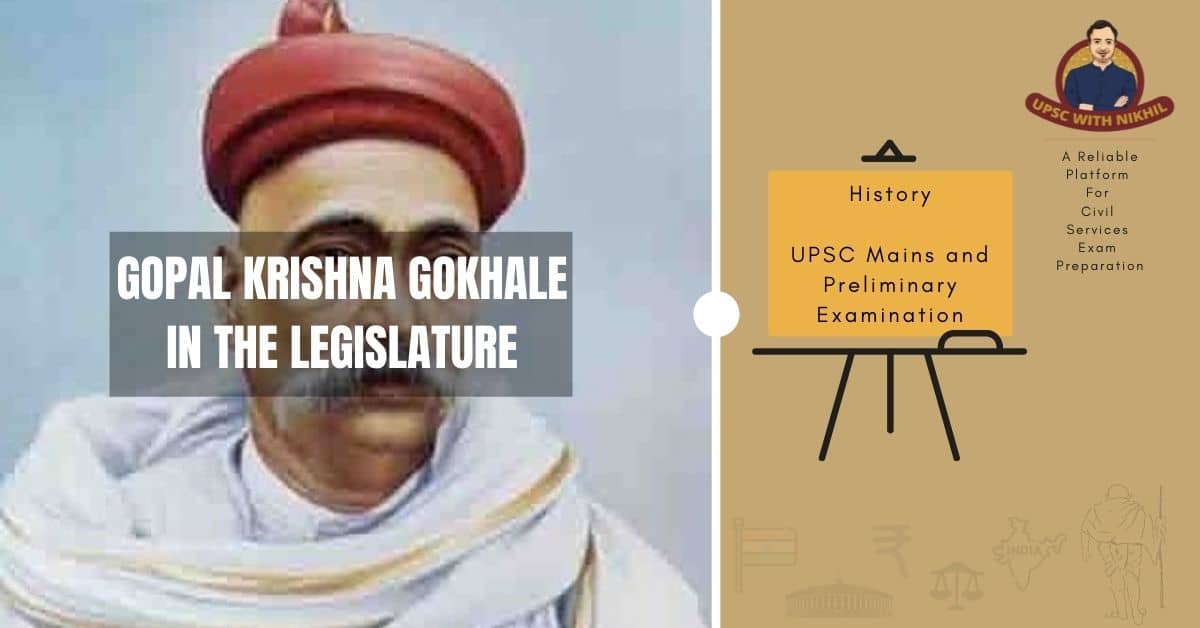Gopal Krishna Gokhale In The Legislature
Gopal Krishna Gokhale was a brilliant intellectual who had received a thorough education in Indian economics from Justice Ranade and G.V. Josh'. He wasn't much of a public speaker. Tilak, Dadabhai Naoroji, and R.C. Dun all used strong and forceful language, but he did not. He also didn't resort to humour, irony, or courteous sarcasm, as Mehta did. He was a gentle, reasonable, courteous, non-flamboyant, and lucid speaker. He primarily relied on detailed knowledge and meticulous data. As a result, while his speeches did not entertain or hurt anyone, they did gradually capture the attention of listeners or readers due to their sheer intellectual power.
G.K.GOKHALE IN LEGISLATURE:
Gokhale rose to prominence as a result of his budget speeches, which were widely covered by the press and whose readers eagerly awaited their morning copy. He intended to turn the Legislative Council into an open university where citizens could receive political education.
• His first budget speech, delivered on March 26, 1902, cemented his reputation as India's greatest parliamentarian. Edward Law, the Finance Member, had just presented a budget with a seven-crore surplus, for which he had received the house's congratulations with great pride. Gokhale rose to speak at this point. Because of the large surplus, he said he couldn't "conscientiously join in the congratulations."

• The surplus budget, on the other hand, "illustrated the complete lack of a proper correspondence between the state of the country and the state of the country's finances." In fact, this surplus came at a time when the community was suffering from severe depression and suffering, and it was considered a "wrong to the community."
• The poverty of the people was the central theme of his speech. He looked at the problem from every angle and concluded that the general public's material situation was "steadily deteriorating" and that the phenomenon was "the saddest in the entire range of world economic history."
• He then set out to thoroughly examine the budget. He demonstrated how land revenue and the salt tax had risen despite drought and famine. He requested that these two taxes be reduced, as well as the minimum income threshold for income taxation to be raised to Rs. 1,000, so that the lower middle classes are not burdened.
• He decried the large sums spent on the army and territorial expansion beyond Indian borders, instead calling for more money to be spent on education and industry.
• He claimed that the handling of Indian finances revealed that Indian interests were always subordinated to foreign interests. He linked the colonial status of India's economy and polity to the poor state of its finances and the poverty of its people.
• The people were enthralled by Gokhale's first budget speech, which had an "electrifying effect." As his biographer, B.R. Nanda, has put it: ‘Like Byron, he could have said that he woke up one fine morning and found himself famous”.
• Even his harshest critics praised him right away, and the entire nationalist press applauded him. He was thought to have boosted Indian pride to new heights.
• The Amrita Bazar Patrika, which had missed no opportunity in the past to berate and belittle him, gave unstinted expression to this pride: ‘We had ever entertained the ambition of seeing some Indian member openly and fearlessly criticising the Financial Statement of the Government. However, this ambition was never realised.
• When members had ability, they had not the requisite courage. When they had the requisite courage, they had not the ability. . . For the first time in the annals of British rule in India, a native of India has not only succeeded in exposing the fallacies which underlie these Government statements, but has ventured to do it in an uncompromising manner.” All of this well-deserved acclaim did not rub off on Gokhale. He maintained his unassuming and modest demeanour.
• To G.V. Joshi (leading economist and one of his gurus), he wrote: ‘Of course it is your speech more than mine and I almost feel I am practising a fraud on the public in that I let all the credit for it come to me.”
• In the next ten years, Gokhale was supposed to bring this "mixture of courage, tenacity, and ability" to bear on every annual budget and every piece of legislation, highlighting the misery and poverty of the peasants, the drain of wealth from India, the government's neglect of industrial development, the poor's taxation, and the lack of welfare measures such as primary education and health and medical care.
• Gokhale was to be lavishly rewarded with the love and admiration of his own people. They were so proud of his legislative accomplishment that they gave him the title of "leader of the opposition."
• Gandhiji was to appoint him as his political mentor. And Tilak, his lifelong political opponent, said at his funeral: ‘This diamond of India, this jewel of Maharashtra, this prince of workers, is taking eternal rest on the funeral ground. Look at him and try to emulate him.”


